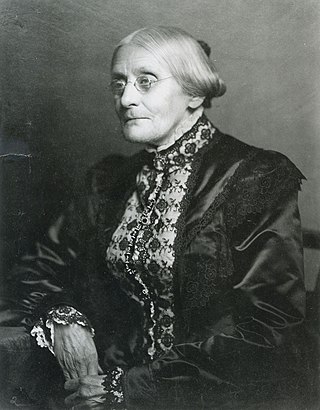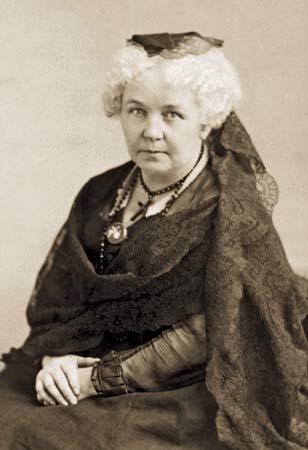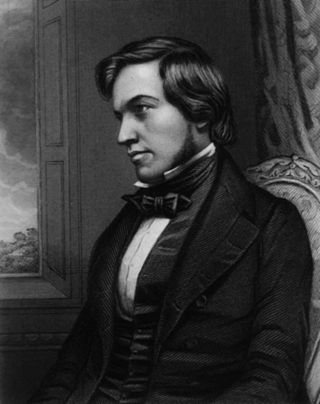Related Research Articles

Susan B. Anthony was an American social reformer and women's rights activist who played a pivotal role in the women's suffrage movement. Born into a Quaker family committed to social equality, she collected anti-slavery petitions at the age of 17. In 1856, she became the New York state agent for the American Anti-Slavery Society.

Elizabeth Cady Stanton was an American writer and activist who was a leader of the women's rights movement in the U.S. during the mid- to late-19th century. She was the main force behind the 1848 Seneca Falls Convention, the first convention to be called for the sole purpose of discussing women's rights, and was the primary author of its Declaration of Sentiments. Her demand for women's right to vote generated a controversy at the convention but quickly became a central tenet of the women's movement. She was also active in other social reform activities, especially abolitionism.

The Seneca Falls Convention was the first women's rights convention. It advertised itself as "a convention to discuss the social, civil, and religious condition and rights of woman". Held in the Wesleyan Chapel of the town of Seneca Falls, New York, it spanned two days over July 19–20, 1848. Attracting widespread attention, it was soon followed by other women's rights conventions, including the Rochester Women's Rights Convention in Rochester, New York, two weeks later. In 1850 the first in a series of annual National Women's Rights Conventions met in Worcester, Massachusetts.

The National Woman Suffrage Association (NWSA) was formed on May 15, 1869, to work for women's suffrage in the United States. Its main leaders were Susan B. Anthony and Elizabeth Cady Stanton. It was created after the women's rights movement split over the proposed Fifteenth Amendment to the U. S. Constitution, which would in effect extend voting rights to black men. One wing of the movement supported the amendment while the other, the wing that formed the NWSA, opposed it, insisting that voting rights be extended to all women and all African Americans at the same time.

Villanova University is a private Catholic research university in Villanova, Pennsylvania, United States. It was founded by the Order of Saint Augustine in 1842 and named after Saint Thomas of Villanova. The university is the oldest Catholic university in Pennsylvania and one of two Augustinian institutions of higher learning in the United States.

The United States Exploring Expedition of 1838–1842 was an exploring and surveying expedition of the Pacific Ocean and surrounding lands conducted by the United States. The original appointed commanding officer was Commodore Thomas ap Catesby Jones. Funding for the original expedition was requested by President John Quincy Adams in 1828; however, Congress would not implement funding until eight years later. In May 1836, the oceanic exploration voyage was finally authorized by Congress and created by President Andrew Jackson.

Daniel Cady was an American lawyer, politician and judge in upstate New York. The father of activist Elizabeth Cady Stanton, Judge Cady served one term as a U.S. representative from New York.

Harriot Eaton Blatch was an American writer and suffragist. She was the daughter of pioneering women's rights activist Elizabeth Cady Stanton.
The New-York Mirror was a weekly newspaper published in New York City from 1823 to 1842, succeeded by The New Mirror in 1843 and 1844. Its producers then launched a daily newspaper named The Evening Mirror, which published from 1844 to 1898.
The Fatherland was a World War I era weekly periodical published by poet, writer, and noted propagandist George Sylvester Viereck (1884–1962), advocating "Fair Play for Germany and Austria-Hungary". Having been born in Munich, Germany, and moved to New York City in 1896, Viereck graduated from the College of the City of New York and directly entered the world of publishing.

George Fownes, FRS was a British chemist.

Amelia Jenks Bloomer was an American newspaper editor, women's rights and temperance advocate. Even though she did not create the women's clothing reform style known as bloomers, her name became associated with it because of her early and strong advocacy. In her work with The Lily, she became the first woman to own, operate and edit a newspaper for women.

The Woman's Bible is a two-part non-fiction book, written by Elizabeth Cady Stanton and a committee of 26 women, published in 1895 and 1898 to challenge the traditional position of religious orthodoxy that woman should be subservient to man. By producing the book, Stanton wished to promote a radical liberating theology, one that stressed self-development. The book attracted a great deal of controversy and antagonism at its introduction.

Lucretia Mott was an American Quaker, abolitionist, women's rights activist, and social reformer. She had formed the idea of reforming the position of women in society when she was amongst the women excluded from the World Anti-Slavery Convention held in London in 1840. In 1848, she was invited by Jane Hunt to a meeting that led to the first public gathering about women's rights, the Seneca Falls Convention, during which the Declaration of Sentiments was written.
The Sunny South was a weekly literary magazine published in Atlanta from 1874 to 1907.

The World Anti-Slavery Convention met for the first time at Exeter Hall in London, on 12–23 June 1840. It was organised by the British and Foreign Anti-Slavery Society, largely on the initiative of the English Quaker Joseph Sturge. The exclusion of women from the convention gave a great impetus to the women's suffrage movement in the United States.
Golden Days for Boys and Girls was a late 19th-century children's story paper, distributed weekly as an accompaniment to the paper Saturday Night. Running from March 6, 1880, to May 11, 1907, Golden Days cost subscribers $3 a year. It was the brainchild of newspaperman James Elverson (1838–1911), who later owned the Philadelphia Inquirer.

The Chicago Ledger was a story paper published in Chicago, Illinois from 1872 until 1924. Put out by the Ledger Company and edited by Samuel H. Williams, the Ledger was a boilerplate literary magazine. Such periodicals were printed using engraved steel sheets. The plates, or casts of them, were then sent out to be printed and inserted into other newspapers. Ledger subscriptions originally sold for $1 for 52 issues and, by 1879, the paper had a circulation of 10,000. Although begun as a literary paper of "a good class," the Ledger eventually became more melodramatic in tone. In his 1910 book, Newspapers and Periodicals of Illinois, Franklin Scott, notes that "[t]he sensational, although not immoral, character of the Ledger stories, and the use that the large mail-order houses have made of its advertising columns, have given this paper an unusually long life and extensive circulation."

Lillian Ascough was an American suffragist. Originally from Detroit, Michigan, she served as the Connecticut chair of the National Woman's Party (NWP) and as the vice president of the Michigan branch of the NWP. At the August 1918 demonstration at Lafayette Square, Ascough was sentenced to fifteen days in jail. Then, in February 1919 she participated in the watchfire demonstrations and was again arrested and sentenced to five days in jail. She was a speaker in the Prison Special tour of the U.S. during February and March 1919.
References
- ↑ Armbruster, Carol (2014). "Translating the Mysteries of Paris for the American Market". Revue française d'études américaines (138): 25–39. doi: 10.3917/rfea.138.0025 . Retrieved 2021-05-14..
- 1 2 NYR (1841), p. 544.
- ↑ NYR (1841), p. 543.
- ↑ "Notes and Queries", The Ladies' Repository, 17 (3): 186, March 1857
- ↑ "The New World, v.II, no. 2, Whole number 42 Saturday, March 20, 1841, (Incomplete).", digital.library.villanova.edu, retrieved February 20, 2017.
- ↑ "The New World, v. II, no. 15, Whole Number 45, Saturday, April 10, 1841.", digital.library.villanova.edu, retrieved February 20, 2017.
- ↑ "The New World, v. II, no. 16, Whole Number 46, Saturday, April 17, 1841.", digital.library.villanova.edu, retrieved February 20, 2017.
- ↑ "The New World, v. II, no. 17, Whole Number 47, Saturday, April 24, 1841.", digital.library.villanova.edu, retrieved February 21, 2017.
- ↑ "The New World, Quarto Edition, v. II, no. 19, Whole Number 49, Saturday, May 8, 1841.", digital.library.villanova.edu, retrieved April 4, 2017.
- ↑ Gordon, Ann, ed. (2001). The Selected Papers of Elizabeth Cady Stanton and Susan B. Anthony: In the school of anti-slavery, 1840 to 1866. Rutgers University Press. p. 86. ISBN 9780813523170..
- ↑ "The New World, Extra First, no. 19 1/2, Whole Number 101 1/2, Monday, May 16, 1842.", digital.library.villanova.edu, retrieved February 21, 2017.
- ↑ "The New World, Extras 3, 4 & 5, Whole Number 105 1/2, Wednesday, June 8, 1842.", digital.library.villanova.edu, retrieved February 21, 2017
- ↑ "The New World, Extra No. 6, Whole Number 107 1/2, Tuesday, June 21, 1842.", digital.library.villanova.edu, retrieved April 4, 2017